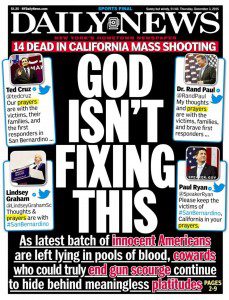
The past 24 hours of the news cycle have been, if nothing else, an interesting exercise in encountering the unexpected. I would have never believed that a major newspaper would publish a cover like this:

That is a bold headline, one that I never would have anticipated seeing (although I don’t know the New York Daily News well enough to know if this is typical of their style).
That was surprising enough. Then outrage over “prayer shaming” happened.
My Patheos colleagues Andrew Seidel, Deanna Boudov, and Matthew Facciani have already dealt well with the subject, but I want to take a look at one particular piece castigating this “shaming” and step back for a second and reflect on how absurd it is that we’re even having this discussion.
What We’ve Lost Is the Plot
The piece that interested me the most out of this whole mess was a Washington Post op-ed entitled “What we lose when we prayer shame politicians after a mass shooting” written by Russell Moore of the Southern Baptist Convention. Moore sometimes surprises me, and he almost always intrigues me even when he toes the party line. He doesn’t quite do that here – or perhaps it’s more that the line here is a bit blurry – but his response is somewhat predictable.
In the first paragraph, Moore says something that I find incredibly remarkable about the NY Daily News cover headline:
I’m hard-pressed to think of a more cynical and exploitative headline at a time of national mourning.
“At a time of national mourning.” When are we not in “a time of national mourning”? Indeed, that seems to be the point: The reason that all of this has culminated as it has is because people are fed up of the same thing happening and nothing being done about it.
I don’t even think that Moore gets the broad sentiment of this backlash against mere prayer as the answer. In essence, he claims that these denunciations of prayer when action should be taken is basically just a way of expressing a sentiment about gun control, and that’s at best only partially right. Most of those speaking out do favor some gun control measure – because that would be doing something.
I’m not one of those people who think that prayer “does nothing” — or rather, I think it does do something, depending on your definition. Does it solve problems? Absolutely not. Does it make some people feel better? Does it, as Moore suggests, signal solidarity with the grieving? I’m sure that for some people, it does. To elevate these aspects of prayer, however, is to again miss the point: What we don’t need right now is mere solidarity, solitary platitudes that make the speaker feel better while accomplishing nothing substantive.
Before I get to my real gripe with Moore’s piece and with essentially all of the “prayer shaming” pieces, one final galling thing from Moore:
Ironically enough, the “Don’t Just Pray There, Do Something” meme will actually keep things from happening. After all, some of our biggest obstacles to policy solutions of any kind is an ideologically fractured populace where virtually every issue is a test of political purity.
I hardly even know what to say to this. I’m not sure that it’s substantively different from the standard refrain of “Stop politicizing tragedies,” but it goes even further: It attempts to blame people who are standing up and saying, “To hell with this, enough is enough,” for the polarization that makes compromise difficult in places like Congress.
Let’s be clear, Dr. Moore: This is not about ideological purity. This is about holding our leaders accountable. That doesn’t make speaking out a “new secularized form of praying.” The leaders we are addressing are real and they hold real power. They can act here. Without making their voices heard on Capitol Hill – and yes, even Twitter can reach there – no one will be able to force Congress to even begin to have the conversation, let alone to see it through to real policy change. They will do what they’ve done every single other time this has happened: They’ll change the subject to mental illness or radicalized Islam or whatever excuse they can find for the latest tragedy du jour.
Speaking of changing the subject…
Stop Making Every Issue About You and Your Faith
Remember what I just said a few seconds ago about how when we try to address a serious issue, someone always changes the subject? Yeah, that happened here.
Consider what Moore says early on in his op-ed:
On the one hand, I tried to give the benefit of the doubt to the prayer cynics. After all, politicians posting to pray is hardly the same thing as prayer meetings.
I’ve been exasperated by the way politicians have used prayer, too. Some campaign “benedictions” are basically campaign commercials containing everything but “I’m John Smith, and I approved this message” at the end.
But those of us who watched others mock politicians who called for prayer also felt as though prayer was an unnecessary target along the way. For most people who are religious, prayer is more than just another way of saying “Message: I care.” (emphasis mine)
Did you see that? Moore appears to agree with the general point: The “prayers” of people like Paul Ryan and Ted Cruz — you know, the ones who made the cover of the NY Daily Times? — are more or less ways of displaying their piety (or, as some commentators have accused the “prayer shamers” of doing, virtue signalling).
But then the focus shifts: “What about prayer? Prayer is this thing we love; how can you just bash it as ineffectual like that?”
They made this issue not about policy, not about our politicians, not about the pull of special interests, but about them.
Centering themselves is more satisfying. No need to talk about the hard issues when you can instead talk about your hard feelings.
You know why prayer is such a ripe target in this climate? Because like our public policies around issues like guns, prayer is the quintessence of saying something that makes you feel good but ultimately has no real impact. When it comes to gun violence, too many of our politicians are saying, “Let’s just pray and hope for the best.”
Saying things like “Prayer doesn’t work” and “God isn’t fixing this” does one thing in particular: It clearly and unequivocally declares that we want action that doesn’t rely on wishful thinking and lofty platitudes in lieu of actual evidence.
So what do you say, religious conservatives? Are you willing to let this issue not be about you for once? Can you relinquish this issue and recognize that, even if prayer serves a real and useful function for you, it isn’t a replacement for real, evidence-based problem solving at our highest levels of governance?
Because if not, I’m not sure that we have a prayer after all.
Image Pixabay















